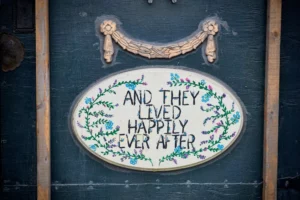Sammy Rhodes is a husband, dad, writer, and college pastor with Reformed University Fellowship at the University of South Carolina. Yet somehow, in the midst of doing all of that, he became a Twitter rockstar. It all happened because of Sammy’s uncanny ability to generate funny quips in 140 characters or fewer (not to mention his popularity with some prominent followers like Rainn Wilson from The Office). Some of my recent, favorite tweets from Sammy include:
It’s like cats don’t even know what incredible mother-in-laws they would make. — Sammy Rhodes (@sammyrhodes) Dec. 28, 2014
Thinking about buying a fishing boat just so I can name it All About That Bass. — Sammy Rhodes (@sammyrhodes) Sept. 8, 2014
Sammy’s Twitter rockstar status hasn’t been without controversy, though. In 2013, actor Patton Oswalt began repeatedly and personally attacking Sammy, claiming that he was plagiarizing other people’s jokes. Sammy briefly attempted to defend himself, but shortly thereafter, he stepped away from Twitter for six months and returned after losing a few thousand followers, but he’s still as hilarious as ever.
Sammy agreed to talk with us about some of the lessons he learned from his experience, and he also shared some wisdom he’s gathered from being a college pastor.
1. You have 118,000 Twitter followers, which is approximately 117,650 more than I have. If I had that many followers, it would totally go to my head. Do you wrestle with pride over the distinction of being a Christian Twitter celebrity?
The thing about being a celebrity is you never feel like one because you’re still the same guy who eats Chick-fil-A in the car while using Jedi-like concentration to not spill Chick-fil-A sauce on your pants. This is even more true when you’re not a real celebrity but someone who sort of, kind of got Twitter famous.
In the height of all the Twitter fame, my weirdest moment was a girl asking me to sign her tank top with a Sharpie at a conference we were both attending. The thing no one tells you about signing an autograph is the waves of shame that wash over you for actually doing it. Nothing you could possibly write can ever take away the profound lameness you feel in that moment.
This was also one of the silver linings of the whole Twitter controversy I went through, where it felt like half of the internet went from loving me to hating me literally overnight. You see how fickle fame and approval are. Approval is a lover that always breaks your heart. Nothing helps you repent of your approval idol like half of the internet threatening to order toilets and have them sent to your house to let you know their hatred is real. Thankfully, that never actually happened.
I think what makes me nervous about celebrity Christian culture, especially being seen as one, is two things. One, it perpetuates this myth that you can ever make it in the Christian life. I have a friend, Tom Cannon, who likes to say that if he could ever make one Christian bumper sticker it would say, “Perseverance beats zeal every time.” Something about our celebrity culture tricks you into believing that if you just follow Tim Keller or John Piper or [insert your favorite preacher] closely enough, you’ll find the shortcut.
The other is that it takes away from the people God placed in your life to love and be loved by, to know and to be known by. I’m afraid celebrity culture undermines the work of the local church. It makes it seem less-than — like a local play we pity while we wait to go see the real actors on the big screen. But the local church is where the real action takes place. It’s the context of the whole Christian life. It’s why Jesus had seven letters for seven different churches, not one letter for one church and its six different multi-sites. Not that multi-sites are inherently bad — it’s our obsession for our pastors to be celebrities instead of local guys loving local people that seems to go against the grain of Scripture. It’s destructive both for them and for us.
2. Is there a part of you that would like to throw away your smartphone and quit social media?
Yes, please. The six-month break I took from Twitter was some of the best time I’ve ever had in terms of feeling free from the burdens and temptations of living life online; although, I’d be lying if I said I didn’t just Instagram and Facebook more. That’s the temptation of the internet: to feel like you have a life instead of actually having a life. The older I get, the more I think it would be nice to get a job writing and farming with Wendell Berry, living off the land. And an occasional in-town run to Starbucks to binge-watch some Netflix. That would be perfect.
Anytime I have a long conversation with a friend without once checking my phone, I feel like I deserve a Gold Medal in Being Present. That makes me sad, but it’s true. The more we learn to speak the language of the internet, the less we remember how to speak the language of intimacy. The temptation of Twitter for me is to find the love and approval I’m seeking from strangers instead of building intimacy with my wife, kids and friends. It’s the temptation to be loved but not known, which in the end is a cheap substitute for being known and loved.
3. Changing topics — last year, Princeton alumnus Susan Patton went viral when she wrote a letter to the women of Princeton and encouraged them to get married before they graduated, because otherwise, their chances of finding good men afterward would be much lower. You’re a college pastor; do you think women should try to find their husbands before they graduate?
Do I think women (and men) should be open to dating with an eye to marriage and should not be afraid to get married younger than what’s typically acceptable in our culture? Yes. Because I believe marriage is more about committing yourself to the hard work of love as a verb than magically finding love as a noun with a soul mate. I want people to be open to finding what Gary Thomas calls a “sole mate.” Not The One, but a someone who loves Jesus and loves you, a best friend who will walk through the rest of your life with you. College is a great place to find a someone who will be that “sole mate.”
I also wouldn’t want women to think if they haven’t found a someone by the time they graduate, they’re banished to the Island of Misfits with Rudolph and Hermie. That’s what I think is so radical about what Paul says about singleness. It’s just as much the gift of God as marriage is. It’s not like the weird gift from your creepy uncle at Christmas. It’s a gift God gives all of us for a season. A gift within which we get to know Him and ourselves better. It would be a shame to waste that gift in the name of some desperate Where’s Waldo search to find a husband before leaving college.
I think the trick is taking advantage of this great opportunity to meet your spouse while realizing you can trust God with your spouse. You can trust God with your spouse because He already is your Spouse, in the sense that He’s the One who’s most committed to loving you for better or for worse. Being a Christian changes the way you date and do marriage. It just has to.
4. I can’t imagine how many times young men come to you and say that they’re struggling with a porn addiction. What’s the most effective plan of recovery you’ve seen in men who have learned to live in sexual freedom?
I like to say that nine guys out of 10 struggle with porn, and the 10th guy is lying. I have this conversation a lot, at least twice a week typically with guys, girls too. Either they’re confessing for the first time this is a struggle, or we meet every other week to talk about their particular struggle.
The most effective plan of recovery is one that deals with both the hands and the heart of lust. When I say “the hands,” I’m talking about how Jesus said, “if your right hand causes you to sin, cut it off and throw it away” (Matthew 5:30). In the case of lust, this means for any longterm recovery there has to be a commitment to getting rid of or locking up all the sources from which I access porn. Lust is like a fungus. It grows best in the dark. Part of bringing it into the light is admitting to others that you need help with your phone/TV/laptop/Xbox because it’s causing you to stumble. Literally getting rid of your “right hand” would be super inconvenient, just as it will be somewhat inconvenient for you to get rid of your porn sources. But here’s the thing: Inconvenience that helps keep me from stumbling is always better than convenience that keeps me stumbling.
The harder part is the heart part. Why am I drawn to porn in the first place? That’s the question. In my own story it was a combination of abuse and turning to porn as a coping mechanism when my dad left home. My heart was involved at the emotional level from an early age. This is the harder work when it comes to porn. There’s no accountability software for your heart. I wish there were because then you and your friends could see the history of your heart that led you to porn, both in the moment and as an addictive pattern. This is the kind of work that involves more than locking up your iPhone. It involves good counseling. It involves the community of recovery groups. It involves getting your hands on anything and everything that can invite Jesus to deal with your heart.
We would also be wise to listen to Scotty Smith when he says, “I highly recommend visiting a local Alcoholics Anonymous or Sexaholics Anonymous group to watch how people who are serious about dealing with their ‘stuff’ do so.” We can be prideful about our need for healing and where we think it should come from. It’s why I love the Naaman story in 2 Kings 5. He thinks his healing has to come from the palace. Instead, Elisha’s servant boy tells him to go wash in the nasty Jordan River. It seems God loves to humble us when it comes to our healing. Mainly because what we often need healed first is the pride that keeps us from admitting and finding the kind of healing we need.
5. If you could go back and give your single self any dating advice, what would it be?
I would go back and tell my single self two things. Number one, just because your friends are starting to date someone doesn’t mean you have to or that something is wrong with you because you’re not dating. That’s why I love the scene in The Lion, The Witch, and the Wardrobe where Aslan, the Christ figure, and Edmund have that heart-to-heart, and C.S. Lewis writes, “There is no need to tell you (and no one has ever heard) what Aslan was saying, but it was a conversation which Edmund never forgot.” The implication is that we have to make room in our own lives for Jesus to lead us and deal with us specifically in ways that are different from the ways He leads and deals with others.
I would also give myself a copy of Les Newsom’s article, “Dating and Freedom.” He makes such a compelling case for dating in light of the covenant, which I think is incredibly demanding and freeing all at the same time. It’s counter-cultural in the best sense of that word. He basically says that biblically speaking, there are only three categories for the male-female relationship: friends, engaged and married. Most of us do dating like it’s a pretend marriage. We want marriage-like privileges without marriage-like commitment or responsibilities. We’re relationally impatient. I would give myself a copy and tell myself to read it slowly, then go fight about it with someone older and wiser than me.
We really appreciate Sammy taking the time to talk with us, and if you’d like to check out more of Sammy’s material, you can follow him on Twitter @sammyrhodes or check out some of his longer form writing at SammyRhodes.co.












